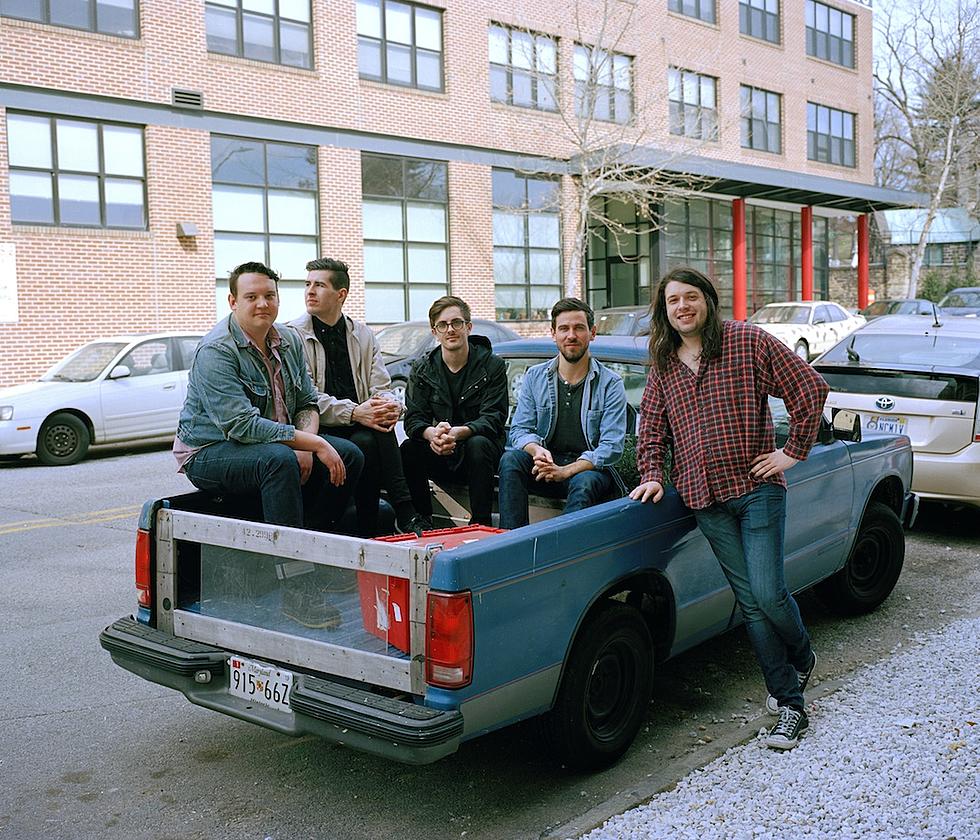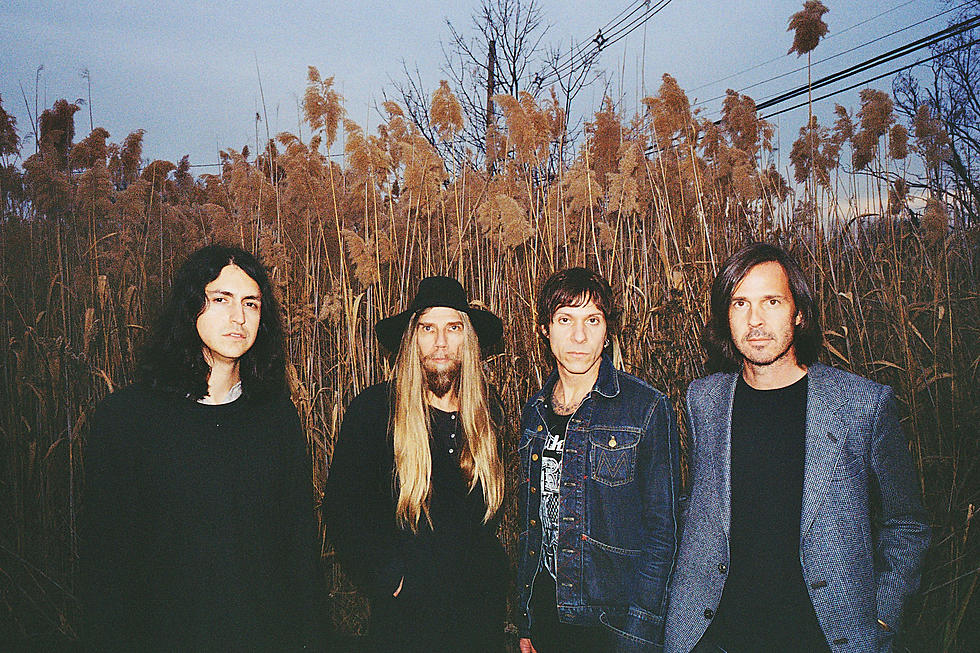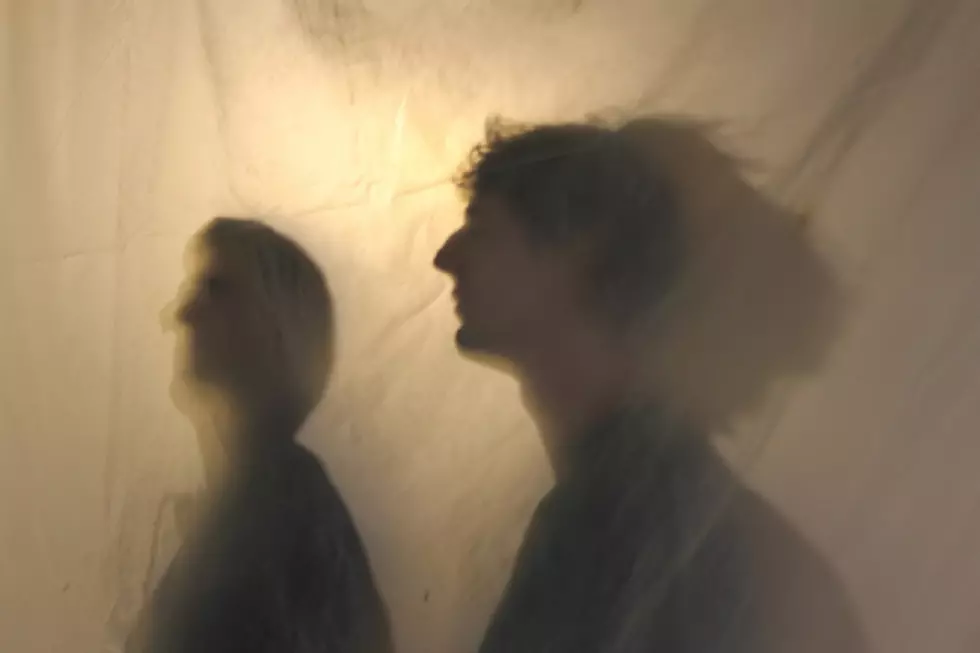
In Ides of Gemini, Those Who Can Do Sometimes Review
As everyone knows, album number three is critical for a band. Your audience should be established, you've found your sound / are on your way there, and your live show is dialed in. So, with the loss of drummer Kelly Johnston-Gibson and a subsequent personnel reshuffling, it's safe to say there was a bit of turmoil within Ides of Gemini at maybe the most critical of junctures. Nevertheless, the "new" band that emerged on the other side seems poised to build upon the witchy, slow-burn gothic work of their previous two Neurot / SIGE releases. Enter Adam Murray on bass and Scott Batiste on drums, alongside founding members J. Bennett and Sera Timms (who moves to vocals only). Most importantly, enter Women, streaming in full today courtesy of Rise Above Records (out tomorrow, April 28).
Bennett isn't exactly your typical guitarist. Outside of his work in music, you may recognize the name as a music journalist for virtually every publication imaginable, including Decibel, Noisey, Revolver and even this one (full disclosure). Being tasked with analysis of the very scene one calls home can be tricky, so we asked Bennett about being a journalist and artist simultaneously, the issues that presents, and how one can feed into the other. Head below for the full interview, as well as an exclusive stream of Women in its entirety (order yours).
Women marks your first entry with Rise Above, and away from the Neurot / SIGE partnership that marked your first two releases. Was there a reason for the change?
Rise Above approached us, and we were in a spot where so much was changing with the band. Kelly, our drummer, got injured while we were on tour with the Mountain Goats, which caused us to have to cancel dates. She ended up leaving the band, but we got Scott from Saviours in, so that was a big change. Some point after that, Sera stopped playing bass, so we got a bass player in. Change was in the air, so when Rise Above hit and we made all of these changes to the band, it seemed like the right thing to do. We pretty much changed everything except for the fact that Sera is singing and I am on guitar. Almost everything else is different.
So, her leaving the bass seat preceded Adam Murray’s addition on bass.
So, Scott did a tour with us on the West Coast, and we did that as a three-piece with Sera playing bass. She had already started talking to me about how she was over playing bass and how she wanted to just sing. I was initially against that, because three people in a band means less problems, compromise, etc., etc. It just makes everything easier. But her heart wasn’t in it, so we went with it.
Adam is a bass player who plays in a band in L.A. called Deth Crux. So, we had a party at our house New Year’s Eve 2015, and we just “popped the question.” I think that Scott and Adam have really taken the band to the next level. One thing that Sera and I didn’t anticipate is the fact that her off of bass has opened up a whole new world of possibilities for her vocally, because she is no longer confined by what she can sing and play at the same time. Why that didn’t occur to either of us, I don’t know. So, it was absolutely the right move all along.
Scott did time in Saviours, and he plays a completely different style than your previous drummer. How do you think that opened up your personal songwriting style, and how did that lend itself to the record?
Scott is definitely honoring Kelly’s style of playing while adding his own style to it. I actually had a bunch of stuff written for material for this record, and when Scott came on board, I pretty much threw it all out the window because it felt like it was moving in a different direction, and that was exciting. So, all the new stuff was written with Scott in mind specifically; I think I maybe kept one thing that was done with Kelly in mind. It’s a new setup, so let’s take advantage of what we have.
Scott is really good with arrangement ideas, so he made a lot of suggestions for things I wouldn’t have come up with on my own. Things that would not occur to me to do. It improved the material and the entire record.
In a lot of ways, like you said, this feels like a whole new band. Even in the way you play guitar, it feels entirely different than the last record. Part of the change is with personnel, but another part is where you and Sera are at musically right now. What do you think is different between those songs with Kelly and with Scott?
First and foremost, it was definitely the arrangement suggestions that Scott made. But I felt like I was taking advantage of the fact that Saviours was such a hard and heavy band. So, we tried to do things heavier and faster than what we used to do, but also we have some songs that may be the least heavy stuff that we do. And part of that is just me getting better. When you’re playing with people who are at the level of Scott and Adam, it makes you up your game. I threw out a lot of stuff, but I’m not being precious about it because I’m proud of where we are. It forced me to up my game, which I am extremely grateful for.
The title Women is striking. What was the overarching idea behind the LP?
All the songs are about women, hence the title. I always have the title for the next album before the current one comes out. Once I started writing the LP with Scott, I noticed that all of the titles of the songs were women’s names, or referenced females in some way, so I just thought let’s go with Women. I title all the songs and will tell Sera what inspires the title. She’ll ignore that and come up with her own interpretation of the title in the lyrics.
Interesting. So, sort of backing into it. You come from the hyper-fertile Boston scene, the same that gave birth to ISIS and challenged the way we viewed hardcore, punk and metal. How did that scene affect the way you view music as a journalist and as a musician?
That period in my life — from the late '90s to the early 2000s living in Boston — was pivotal. I was working for Hydra Head, writing all their bios and marketing materials. I’m on tour with Mustard Gas & Roses with Mike Gallagher from ISIS; Aaron Turner runs SIGE and he was also in ISIS — these are all people that I consider lifelong friends. Mark Thompson, who was running Hydra Head, now runs Vacation Vinyl in Los Angeles. Seeing bands like ISIS, Cave In and those bands in Boston, they completely changed my idea of what was possible. Another thing I think is worth mentioning is that I didn’t play music during that period, and part of it was because I was so heavily invested in writing, and in retrospect, I can see now that I couldn’t compete with those guys. When ISIS and Cave In are the local bands, it’s easy to think, “I can't do anything like that.” That sensibility of this mix of metal and hardcore and rock 'n' roll — they were doing that way before all the metalcore bands from Massachusetts were. They were doing that first. To me, that is who is responsible for the good version of that. What Cave In and what ISIS were doing at that time … I feel extremely fortunate to be around during that time. It left a permanent impression on my fragile psyche.
What is criticism worth to you as an artist?
You know, my relationship has sort of changed with that over the years. When you start working at a place, they usually give you reviews first before they move you up the ladder. So, I was writing a ton of reviews and I wasn’t playing music at that time. Now, and even in the years leading up to Ides of Gemini, I sort of eased back on the reviews, and that’s because my perspective changed. I’m not sure if analyzing something is as valuable as being taken in by the atmosphere of it. I write very few record reviews nowadays, and I only write record reviews of things that I enjoy. It’s not productive for me to shoot down someone else’s record. I did a lot of that of that when I was younger, some of which I regret, but being young and arrogant ... there are plenty of people doing that now. I think now, with internet culture, it seems to be the cool thing to flag people. I'm not into that. Seems counterproductive.
What do you think are the biggest challenges of being a journalist in the very field that you cover?
I try to separate church and state as much as possible, but I have recently run into situations where certain outlets won’t cover Ides of Gemini because they feel like it’s a conflict of interest. So, that’s a little weird for me — I’m freelance, but because I contribute to your website, you won’t cover my music, even though my music is the basis of your website? It just seems like a “fuck you.” At the same time, I’m not worried about it. That’s really frustrating.
Have you ever run into an awkward situation as a musician with someone that maybe you weren’t so flattering to in print?
Luckily, that hasn’t happened yet. I’ve had incidents with people in the past, but nothing in the context of Ides of Gemini or another band where it becomes an awkward scenario for the band. In the capacity of just writing, I’ve had people accuse me of misquoting them — that has happened to me a few times. I save all my tapes, though, so I squashed all that stuff. Again, I haven’t written anything negative about anyone in a long time. That said, if you’re putting something out in the world, you can’t expect to everyone to like it. If you don’t like it, then you go do something else. That’s my attitude about my own band, and I have no sympathy for a band who thinks otherwise. That’s what happens. Not everyone is going to like what you do. I certainly don’t expect anyone to like my bands.
Who do you think was the most interesting subject you’ve ever had, and what’s an interesting anecdote from one of your encounters?
I’ve had some amazing experiences with some interesting people over the years. One of my favorites — and it’s sort of ongoing — is interviewing Buzz Osborne for a recurring series for Decibel where we go and do different activities around Los Angeles.
First, we went to Disneyland with all of the Melvins, which at the time was the Big Business guys. Buzz and Dale [Crover] have season passes to Disneyland; they love it and they know everything about it. Every detail. They know where all the hidden cameras are on Space Mountain and the roller coasters, and I bought photos from Space Mountain where they’re making faces and I’m the only one who is oblivious to where the camera is. I bought those Mickey Mouse ears and I have photos of each of them with them on.
The next one that we did was Buzz drove my car around Los Angeles, and we just sort of drove around to different spots in L.A. and commented on the weirdos walking around Hollywood. We stopped at a party store, and I took a photo of him holding a single red balloon. Our next outing was golfing, which he loves to do and I have never done. And the next one, which we are doing in a couple weeks, we’re going to a Dodgers game. He’s big into baseball, and I haven’t followed since I was a kid. Stuff like that is cool to me, where you get a different perspective on people.
I’ve interviewed Kool Keith and Vincent Gallo — who will only do an interview with you if you put him on the cover of your publication. I’ve been on tour with Queens of the Stone Age in 2003 …
Arguably their peak.
It was the last Lollapalooza tour, and they were touring off of Songs for the Deaf. Nick Olivieri was still in the band — I saw them every night for six weeks. Great experiences.
Have you ever been starstruck?
Maybe when I was younger and not used to meeting people in bands that I looked up to. But it’s been a while. I think I’ve been pretty successful at subtly communicating that I don’t care how famous you are. Either you’re gonna be cool or you’re not. One of the coolest guys I have ever met was Rob Halford from Judas Priest, though — very kind, great sense of humor, a great listener, a complete sweetheart. I’m a big fan.
I feel like I’m not sure if it could happen anymore, but there are still a handful of people where it could. One of them is Iggy Pop — he might do it for me. [Laughs]
More From CLRVYNT









